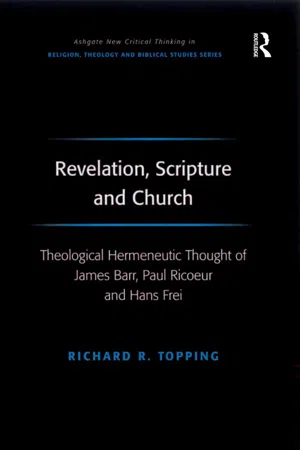
Revelation, Scripture and Church
Theological Hermeneutic Thought of James Barr, Paul Ricoeur and Hans Frei
- 252 pages
- English
- ePUB (mobile friendly)
- Available on iOS & Android
Revelation, Scripture and Church
Theological Hermeneutic Thought of James Barr, Paul Ricoeur and Hans Frei
About This Book
How does God's involvement with the generation of Holy Scripture and its use in the life of the Christian church figure into the human work of Scripture interpretation? This is the central question that this book seeks to address. In critical conversation with the influential hermeneutic programs of James Barr, Paul Ricoeur and Hans Frei, Topping demonstrates how God's agency has been marginalized in the task of Scripture interpretation. Divine involvement with the Bible is bracketed out (Barr), rendered in generic terms (Ricoeur) or left implicit (Frei) in these depictions of the hermeneutic field. The result is that each of these hermeneutic programs is less than a 'realist' interpretative proposal. Talk of God is eclipsed by the terminal consideration of human realities. Topping argues for the centrality of doctrinal description in a lively theological understanding of Scripture interpretation for the life of the church.
Frequently asked questions
Information
Chapter 1 Revelation and Biblical Interpretation: Divine Disclosure and the Constitution of Faith
James Barr: Cumulative Tradition and Its Soteriological Function
The Problem of Revelation
Table of contents
- Cover Page
- Half Title Page
- Series
- Title Page
- Copyright Page
- Dedication
- Contents
- Foreword
- Preface
- Introduction
- 1 Revelation and Biblical Interpretation: Divine Disclosure and the Constitution of Faith
- 2 The Bible as Holy Scripture: Construal and Authority
- 3 The Church and the Bible Critically Read
- Conclusion
- Index